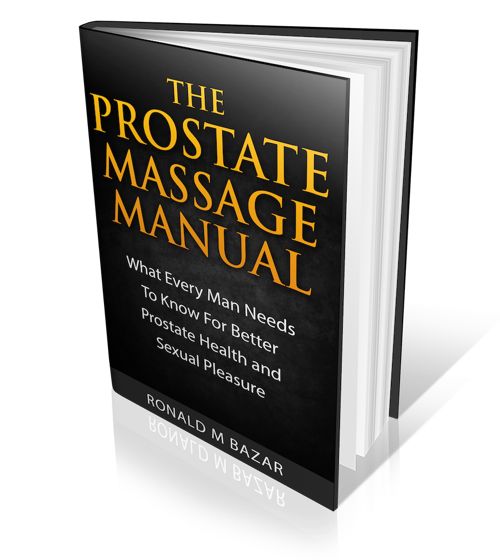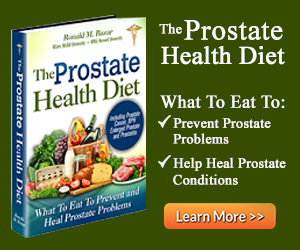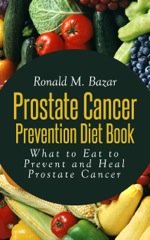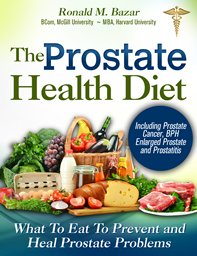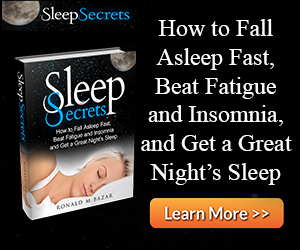
Symptoms of Enlarged Prostate You Need To Know
Do you suffer from the symptoms of enlarged prostate?
The medical condition is known as 'benign prostatic hypertrophy' or 'benign prostatic hyperplasia,' commonly referred to as BPH.
BPH symptoms range from mild to extreme, where mild ones have only a minimal impact on your life while extreme ones will dominate your day and night with major discomfort and pain.
Even if you think you don't have a problem now, it could be building if you are not following good prostate habits and good health habits in general. The earlier you can adopt healthy prostate habits, the much greater the chances of avoiding conditions later on.
The troubling thing is that prostate problems are happening to more and more men and at an earlier age than before. Men in their 40s and 50s are now demonstrating prostate problems, and this was very rare a generation ago.
So why do doctors tell their patients, “There was nothing you could have done to prevent this”? It may be because doctors don't want to give people the idea that, ultimately, they have the ability to control their own health. Perhaps even more often, doctors don’t believe that people can control their health.
The medical industry creates the dependency — of us on them — by implying that disease is random, spontaneous, and that the medical authorities have control over health, disease, and treatment.
Well, dear reader, look into the mirror. You are the one responsible, and you can be the one who changes course to healing and prevention.
BPH is a non-cancerous growth of the prostate gland. This now bigger prostate squeezes the urethra pee tube that it surrounds, causing a whole range of symptoms from very mild to extreme. As the prostate grows larger, it presses against the urethra like a clamp on a garden hose.
The bladder wall becomes thicker and irritated. The bladder begins to contract more often even when it contains small amounts of urine, causing more frequent urination. As the prostate grows, it applies more pressure to the urethra. Eventually, the bladder weakens and loses the ability to empty itself, and so begins a whole range of uncomfortable to painful symptoms.
The extreme version is called acute urinary retention — when you are unable to pee at all. It is the most painful of the symptoms and can be relieved by the insertion of a catheter. If acute urinary retention is unaddressed, death can result in about two days.
It is possible to have prostate enlargement and prostate cancer at the same time, but having BPH does not increase your chances of developing prostate cancer. It is very rare to have both conditions.
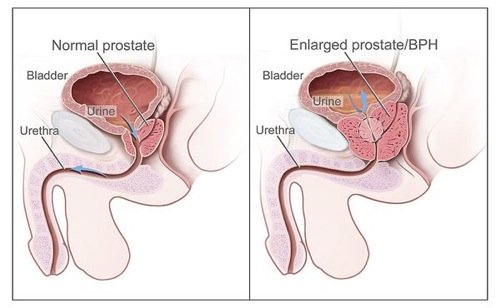
East vs. West on Symptoms of Enlarged Prostate
Remember that I said at the beginning that "Most Western men will eventually suffer from the symptoms of an enlarged prostate." But this is not true for Eastern men.
Doctors say that prostate disease is the natural course of things as a man ages. In fact, doctors go so far as to say that aging is the cause! But that observation is not as causal as they claim. Correlation is not causation!
Prostate diseases are not universal as doctors imply. If their claims were true, why is it that in traditional societies in other parts of the world there is virtually no prostate disease? Prostate diseases are extremely rare to a ripe old age in these societies.
For example, there is a remote northern Japanese island called Okinawa. The Okinawans are known for their healthy aging and longevity. The men live active lives right to a very old age... and do not suffer prostate ailments.
This is similar to many other Asian enclaves not touched by our Western modern lifestyles. A Western male is 30 to 50 times more likely of getting clinical prostate cancer than an Asian, Indian or African man. An American fares even worse, especially Black Americans.
Worse, prostate diseases now happen to younger and younger men. It is not just an old man's disease anymore. We all know people who are having some kind of prostate problem. We need to examine more closely what happens to men as they get older.
The Okinawans prove that old age does not cause prostate diseases. It is what we do over the course of our lives that causes our health problems.
Mild Urinary BPH Symptoms of an Enlarged Prostate
These mild urinary symptoms of an enlarged prostate can include any or all of the following:
- waking up 2-3 times at night to go pee
- occasional hesitancy when you have to go
- some dribbling happens from time to time after
- more frequent peeing when it is cold out
- occasional more frequent urinations and urgency to go
Mild Sexual BPH Symptoms of an Enlarged Prostate
Other than urinary symptoms, there are also sexual symptoms that can be expected:
- ejaculate does not have the normal creamy white color—it is a bit clearer
- less ejaculate is produced
- fewer hard erections and some difficulty maintaining them
As these mild symptoms of enlarged prostate slowly worsen with time, some more pronounced or extreme BPH symptoms result from time to time.
Extreme Urinary BPH Symptoms of an Enlarged Prostate
- You have to go pee again and again, frequently, because your bladder just doesn't seem to empty enough and it constantly feels full.
- Your sleep suffers because you wake up at night more and more often to pee.
- Sometimes you have to pee so bad, but it is hard to start.
- Once you do finally pee it sometimes stops and dribbles until it starts again.
- You obsess about where to find the next bathroom once you leave home.
- Sometimes your pee feels burning hot while you go because you have to go so badly, but only a little comes out — it hurts so much you could scream!
- Other times, the urge comes so suddenly and powerfully and is almost impossible to hold back for very long—you hope you get to the can in time!
- You find yourself uncontrollably dribbling into your underwear.
- You suddenly find yourself needing to go urgently, desperately, but nothing comes out! Yikes this is the worst!
- Sadly, these symptoms result in erectile difficulties in some men and reduced sex drive, limiting your ability to have and sustain an erection and have ejaculations
Sad is how you feel at best!
No man wants the feeling of:
- having to wear adult diapers;
- having to go every 5 minutes for hours on end;
- complete blockage and inability to pee at all;
- needing to use or wear a catheter;
- urgency — the need to go right NOW!
Extreme Sexual BPH Symptoms of an Enlarged Prostate
- when you have sex, ejaculation hurts and/or only a tiny amount of semen comes out.
- ejaculate does not have the normal creamy white color — it is clear and there isn’t much of it, or non at all!
- drops of blood appear in your semen or when you pee.
- no more sex, erections or ejaculation.
Most Western men will experience an ever-enlarging prostate. How will you know when it’s happening to you? Your peeing will show you. Difficulties ensue as the prostate starts to grow and presses up against the bladder. The enlarged prostate starts to squeeze the urethra, eventually restricting the flow out from the bladder.
This decreases your ability to empty the bladder. Retained urine makes an environment ripe for bacterial growth and infection. Urine can back up into the kidneys further spreading infection. More severely, the infection can spread into the blood. A complete inability to release urine is known as acute urinary retention, which is life threatening and extremely painful.
Another symptom of prostate disease is the decline in sperm count. Toxins are entering our sperm and cannot be removed fast enough by our ailing prostates. Sperm count has dropped about 50% over the past 50 years.
So what happens from the perspective of a man with an enlarged prostate? In layman's terms, here are some prostate problem signs...
Men with partial blockages will find that certain environments or activities inhibit the urethra or bladder from relaxing and releasing pee, such as cold temperatures or a long period of not moving. Taxi drivers and truck drivers are examples of professions with higher risk of enlarged prostates. Add office workers to the list! Sometimes the opposite can happen — the cold temperature makes you go pee even more often.
Some men will not know they have an enlarged prostate because they are unaware of these symptoms. Then it comes as a surprise when they have an examination by a doctor.
Some men will not experience any enlarged prostate symptoms at all ... until they suddenly find it hard or impossible to go pee. This condition, called acute urinary retention, can be triggered by taking over-the-counter medicines for colds and allergies, excessive drinking, cold temperatures, or prolonged periods of sitting.
Know these symptoms of an enlarged prostate so you can prevent them from happening or cure them if you find yourself suffering from some of these life changing conditions.
Welcome to the world of men's prostate problems!
Each man will experience their BPH symptoms of an enlarged prostate differently. We all have our own unique combination of symptoms. It is important to recognize symptoms early and to start changes to prevent the symptoms from worsening, heal your body, and reverse the damage. Ignore all the fear mongering around the prostate.
The message is clear — your health is your wealth — and prostate health is the key to your functioning as a vital man who is able to have a full life and a great sex life into old age.
There is a lot to learn, particularly about diets, because most so-called "healthy" diets may still lead to diseased prostate conditions. In fact, that is exactly what happened to me!
Every person is different, and you need to learn how to tell what foods are right for you. I will show you how to test foods so that you can know what foods are right for you to eat. Food has a major impact on your symptoms of enlarged prostate. Sometimes just eating the wrong food can trigger a minor to major prostate attack.
In the meantime do the following:
- Drink less after supper so that you need to pee less during the night. Avoid caffeine, as it is a diuretic that will make you go pee.
- Pee when you have to. Try not to wait.
- Drink less alcohol, which increases urine production.
- Stop taking decongestants. They can cause the muscles that control urine flow from the bladder into the urethra (the urethral sphincter) to tighten, making peeing more difficult. In fact it can trigger complete blockage all of a sudden in men with BPH.
- Exercise regularly. Inactivity causes the bladder to retain urine. Just do a few bursts of intense exercise for 30 seconds, like walking as fast as you can, doing some push-ups, or running a sprint.
- Do kegel exercise while sitting. Squeeze the pubococcygeus or PC muscle (more on this later). This massages the prostate. Stand more and move more!
- Keep warm in the winter. Cold weather can either lead to urine retention or increase your urgency to pee or both.
- Wear loose underwear or boxer shorts. Excess heat in the scrotum is not good for the prostate.
- Eat more vegetables especially cruciferous vegetables such as cabbage, broccoli, and cauliflower. These veggies help to reduce excess estrogen.
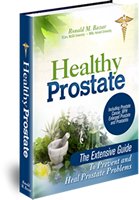 It is also important to have regular prostate checkups with your doctor, including a digital rectal exam and urinary flow tests.
It is also important to have regular prostate checkups with your doctor, including a digital rectal exam and urinary flow tests.For more information on improving your health and reducing the risk of prostate problems with diet, you'll find massive amounts of research, information and links in my book Healthy Prostate: The Extensive Guide to Prevent and Heal Prostate Problems.
Go to Causes of an Enlarged Prostate
Go from Symptoms of an Enlarged Prostate to Prostate Gland Functions
Go from Symptoms of an Enlarged Prostate to Men's Prostate Health
Written by Ronald M Bazar,
~BCom, McGill University
~MBA, Harvard University
~the author of this website.

New Books by Author of This Site
Note Dear Reader...
You must change your diet by stopping those foods that are triggering your condition and replacing them with new ones that nourish you and your prostate.
Then combined with a high quality supplement, you are putting yourself on the road to healing.
There are no shortcuts. Just good changes and little by little you will get better. My books and this site tells you how.
Sleep Secrets by the author of this website.

